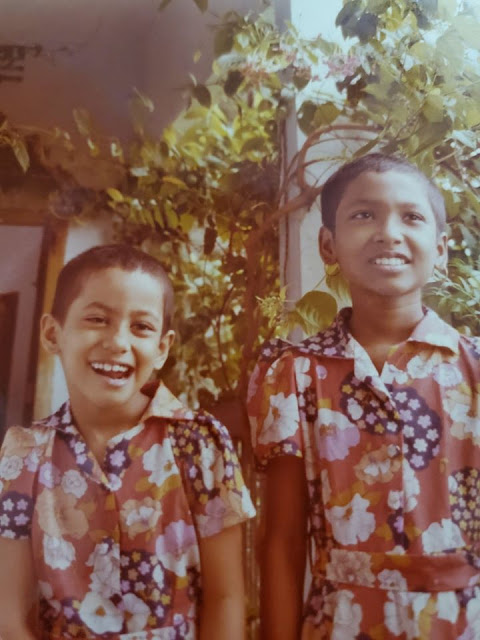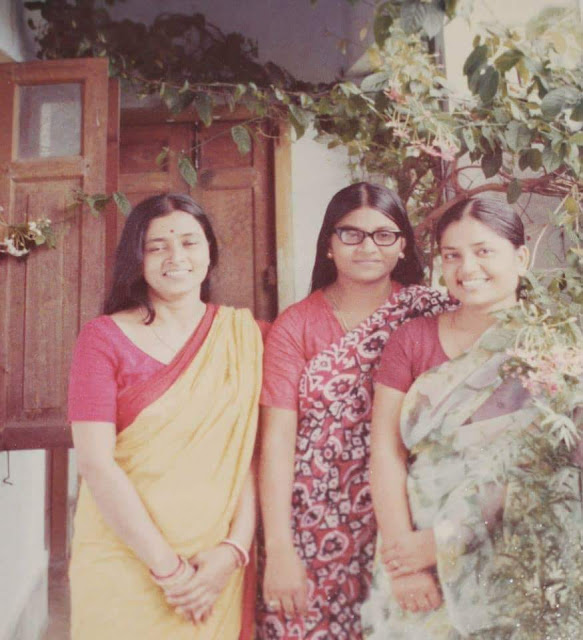"Millions of babies watching the skies
Bellies swollen, with big round eyes
On Jessore Road--long bamboo huts
No place to shit but sand channel ruts...
Millions of souls nineteen seventy-one
homeless on Jessore road under grey sun
...
Millions of babies in pain
Millions of mothers in rain
Millions of brothers in woe
Millions of children nowhere to go"
November 14-16, 1971
Allen Ginsberg wrote this poem after
visiting the refugee camps of the 1971 Bangladesh Liberation War.]
We are on the road. My mom is in a ‘sari’,
and my dad is in ‘lungi’ - all of us are wearing just one piece of cloth. My
mom has her wedding jewelries tied in the waist of her petticoat. Such
beautiful ornaments! Such dazzling ornaments! My grandfather bought gold bars
to make wedding jewelries for his firstborn.
I am riding on my dad's shoulders - my feet
are dangling. My little sister is in my mom's arms. We are leaving. We are
refugees. We do not have a home. We do not want to die. Pakistani armies are
chasing us.
Some villagers give us shelter. We do not
know them. The love of unknown people keeps us alive. My mom wants to keep my
baby sister alive too. She keeps on mixing water with powdered milk and feeding
that to her. My sister is looking like a "Biafra baby" - big eyes,
big head; rickety legs and arms like sticks. Still, we have a long way to go.
Villagers have scattered thorny canes on
their fields. What else could they do? Millions of people are trampling paddy
fields, trampling death - they are escaping to the neighboring West Bengal.
We spent days, we spent nights in unknown
houses in my country, in unknown houses in the neighboring country. At last, we
reached Malbazar of Jalpaiguri, India - my mom's aunt's place. She was my
grandfather's only sister, his beloved little sister. She hugged all four of
us. With her stood her daughters - Sadhana, Kalyani, Bhabani, Shibani; her son
- Shankar; and her husband. They kept on thinking about what all they could do
for us!
We spent five months in their house. We
left our country. We just ran for our life. We were refugees.
We could not bring anything along. We had
no money. My grandfather's sister's family took care of us. How can we ever
repay these people? They are the people who kept us alive. They are the people
who gave us shelter. They are the people who gave us food, gave us clothes.
There was always space for us - in their home and in their hearts.
I am remembering the Pakistan Air Force jets
of the war. I am remembering the bombers of the war. I am remembering the
helicopters of the war. Till now the sky was always a magical place for me -
clouds, birds, stars, rainbow, thunder, and flying seedpods of dandelions...but
now I am remembering death. I am remembering how I fled from Dhaka. I am
remembering blackouts, and dark nights. At the same time, I am remembering a
funeral ceremony. Somebody died in Bhabani aunt's neighbor's house. There was a
big funeral feast. I thought it was a festivity. Well, when war scars a
four-year-old, any food is a festivity! It really did not matter why we feasted,
even if it was for the dead.
We sat down on the floor in long rows. We
were eating on banana leaves. It was a big meal. They gave us 'rosogollas' as
dessert. In the end they gave us sweet yogurt too.
My little sister Shyama is such a slow
eater. She cannot finish anything! My mom is hurrying her. ‘Eat. Eat. Eat the
fish!’ An elderly woman tells my mom, ‘Come on. She is just a little girl. Let
her eat the amount she is able to eat.' My mom's fair face becomes all red from
the insult.
Whenever I think of this story from 1971, I
think as if my mom is “Sarbajaya" **. I think she is that mother from
"Song of the road". “Sarbajaya" means the conqueror of all.
“Sarbajaya" is the undefeated.
[When Pakistan was losing the war in Bangladesh (which was then known as
East Pakistan) and the war was nearing its end, the Pakistani Army, with the
help of the locally
recruited militias (Al-Badr, Razakar, Al-Shams), started systematically killing the people of Bangladesh.
Doctors, engineers, lawyers,
professors, journalists, novelists, artists, songwriters, playwrights, writers,
and poets– the eminent intellectuals of Bangladesh- were killed so that even if
Bangladesh became a new country, it would never be able to stand on its own
feet. Many dead bodies were not found. Many were found - blindfolded, hands
tied, tortured and killed in open fields, in water pumps, and in brick
mortars…headless bodies were found floating in ponds and rivers. Many were
buried alive in trenches in the 1971 genocide. We found my dad’s dead body. He
had been a chemical engineer and a professor in Bangladesh University of
Engineering and Technology (BUET). My
mom was twenty-seven. I was four. My sister* was one and half. My mother has
never re-married. She has finished her Ph.D. from England after my dad’s murder
and raised us all by herself, alone – a Bangladeshi Woman.
* Shyama is currently working as an
engineering manager in Intel, Portland, Oregon and she designs VLSI chips.
** “Sarbajaya” is the 'mother' character from one of the greatest filmmakers of all time, Oscar winner Satyajit Roy’s 1955 directorial debut film “Pather Panchali” (Song of the road). The film is based on the novel written by the famous Bengali author Bibhutibhushan Bandyopadhyay in 1929.]
 |
My mom and I, 1967
|
A history of the Bangladesh Liberation War
India was under the British rule for two hundred years. There
was this saying, "the sun never sets on the British Empire,” describing
the vastness of British rule. In 1947, when the British were at last forced to
leave India, they divided the country based on religion: India for the Hindus
and Pakistan for Muslims. Pakistan had two parts - East Pakistan (today’s
Bangladesh) and West Pakistan (today’s Pakistan).
Hindus from East Pakistan started moving to West Bengal, India.
Muslims from West Bengal, India started moving to East Pakistan – to their
designated lands based on religion. There were riots, there was bloodshed,
there was death; there was barbed wire, guns, and a border-line dividing the
hearts. East Pakistan had more commonalties with West Bengal, India. They spoke
the same language, ‘Bangla’, they ate the same food, and they had the same
culture and ethnicity. Despite their differences, due to their shared religion,
West Pakistan and East Pakistan became one country where Muslims were the
majority.
Geographically, West Pakistan lay over 1,000 miles (1,600 km)
away from East Pakistan. Culturally West Pakistan was very different from East
Pakistan. West Pakistan was rich and advanced for its industrialization, while
East Pakistan was poorer and agriculturally based, with fertile, flat lands,
paddy fields, the Bay of Bengal, and countless rivers full of fish. It was easy
for West Pakistan to become the ruler of East Pakistan.
Gradually, oppression started.
West Pakistan wanted ‘Urdu’ to be the national language of Pakistan; at
the time, the country was split between two languages. Bangla was the language
of East Pakistan. Today’s Bangladesh is a small country: it squeezes a
population of over 160 million people into an area smaller than Wisconsin. But
East Pakistan (today’s Bangladesh) was a very proud nation; they did not want
‘Urdu’ as their national language. The desire to preserve Bangla lead the
people of East Pakistan to fight to protect their language. The language movement
of 1952 inspired UNESCO to declare February 21st as the International Mother
Language Day, to promote cultural diversity and awareness of linguistic
movements worldwide.
In 1969, mass protests broke out as tensions between West and
East Pakistan grew. The oppression inflicted on East Pakistan grew to horrific
levels from 25th March, 1971, resulting in the 1971 Bangladesh genocide, one of
the deadliest and most concentrated acts of genocide in the 20th century. The
outrage against this violence lead to the eruption of the 1971 Bangladesh
Liberation War.
East Pakistan fought for 9 months and on 16th December 1971, a
new country named Bangladesh was born. Four hundred thousand Bangladeshi women
were raped, three million people were killed, ten million people became
refugees, thirty million civilians became internally displaced in the 1971
Bangladesh genocide, and a planned killing of intellectuals took place at the
dawn of independence, a killing which was one of the most brutal massacres in
history.
Published in :
This article was published in American Family Insurance website(Compass) on February 7, 2020. The average Compass story gets about 2,250 individual readers. American Family has nearly 9,000 employees and almost 10,000 agency owners and staff.
Women Chapter Link: Women Chapter














Comments
Post a Comment